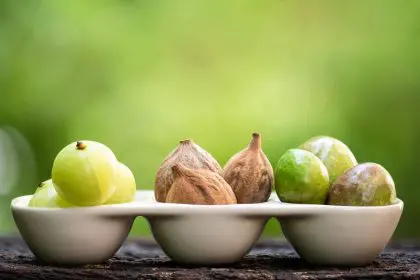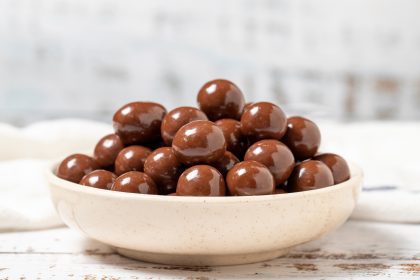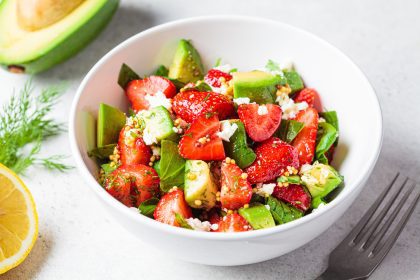While everyone’s obsessing over trendy acai bowls and goji berries, one humble fruit with an extraordinary nutritional profile sits quietly in the produce section, often passed over for its flashier cousins. This unassuming powerhouse packs more antioxidants than blueberries, more vitamin C than oranges, and delivers benefits ranging from glowing skin to potentially reduced inflammation.
The humble persimmon — that slightly odd-looking orange fruit you’ve probably walked past a hundred times — deserves another look. This often-overlooked gem delivers an impressive array of nutrients wrapped in a sweet, honey-like package that’s versatile enough to transform both sweet and savory dishes.
Let’s dive into why this forgotten fruit deserves a starring role in your diet and how to make the most of its remarkable benefits.
The antioxidant advantage that rivals berries
When it comes to fighting free radicals, persimmons punch well above their weight class. These fruits contain an impressive array of antioxidants, including catechins, gallocatechins, and betulinic acid — compounds that help neutralize the damaging molecules linked to premature aging and chronic disease.
What makes persimmons particularly special is their concentrated levels of flavonoid antioxidants, which give them their vibrant orange color. A study published in the Journal of Agricultural and Food Chemistry found that persimmons contain higher levels of certain dietary antioxidants than apples and even some varieties of berries, which are typically celebrated as antioxidant superstars.
These powerful compounds help protect your cells from oxidative damage, potentially reducing inflammation and supporting everything from heart health to cognitive function. Just one medium persimmon delivers this antioxidant punch in a naturally sweet package with only about 118 calories, making it an efficient nutritional investment.
The vitamin C content that outshines citrus
Move over, oranges. Persimmons pack a surprising vitamin C punch that often goes unrecognized. A single medium persimmon contains approximately 22% of your daily vitamin C needs, comparable to what you’d get from many citrus fruits.
This vitamin C bounty delivers more than just immune support. It’s essential for collagen production, giving persimmons legitimate skin-boosting credentials. The vitamin C in persimmons helps maintain the integrity of your skin’s structure, potentially reducing the appearance of fine lines and supporting that coveted natural glow.
Beyond beauty benefits, the vitamin C in persimmons supports iron absorption, wound healing, and even helps manage stress through its role in producing certain neurotransmitters. Unlike synthetic vitamin C supplements, the natural form found in persimmons comes packaged with complementary plant compounds that enhance its absorption and effectiveness.
The fiber profile that supports gut health
Beneath that smooth, shiny skin lies an impressive fiber content that makes persimmons a digestive superstar. A medium fruit delivers about 6 grams of fiber, nearly a quarter of your daily needs, split between soluble and insoluble forms that offer complementary benefits.
The soluble fiber acts like a prebiotic, feeding the beneficial bacteria in your gut microbiome. These friendly microbes produce short-chain fatty acids that help maintain the health of your digestive tract and potentially reduce inflammation throughout your body.
Meanwhile, the insoluble fiber in persimmons adds bulk to digestive matter, helping prevent constipation and supporting regular elimination of toxins. This fiber duo makes persimmons particularly valuable for maintaining digestive wellness, especially since most Americans consume less than half the recommended daily fiber intake.
The carotenoid content that protects vision
That gorgeous orange hue isn’t just for show. Persimmons derive their vibrant color from carotenoids like beta-carotene, lutein, and zeaxanthin — compounds with particular benefits for eye health.
Lutein and zeaxanthin accumulate in the macula of your eye, where they act as natural sunglasses, filtering harmful high-energy blue light that can damage delicate eye tissues. Regular consumption of these carotenoids has been linked to reduced risk of age-related macular degeneration and cataracts, two leading causes of vision impairment.
Beyond eye protection, these compounds convert to vitamin A in the body, supporting immune function, cell growth, and reproductive health. A single persimmon delivers a significant dose of these protective compounds in a naturally sweet package that makes getting your daily carotenoids a pleasure rather than a chore.
The mineral makeup that supports metabolism
Beneath its sweet flavor profile, the persimmon delivers an impressive array of essential minerals that support everything from bone health to energy production. Particularly noteworthy is its manganese content, providing about 30% of your daily needs in a single fruit.
Manganese plays a crucial role in metabolism, helping your body process carbohydrates, proteins, and cholesterol. It’s also essential for bone formation and blood clotting, making it an unsung hero in your overall health picture.
Persimmons also contain meaningful amounts of copper and potassium. Copper supports energy production and iron absorption, while potassium helps maintain proper fluid balance and nerve function. This mineral trio makes persimmons particularly valuable for active individuals looking to support their overall metabolic health naturally.
The tannin content that offers unexpected benefits
The slightly mouth-puckering quality of unripe persimmons comes from their natural tannins — compounds that actually offer surprising health benefits when consumed appropriately. These tannins, particularly abundant in astringent varieties, have demonstrated antimicrobial properties in research settings.
As persimmons ripen, these tannins naturally convert to less astringent forms, creating the fruit’s characteristic sweetness. However, the remaining tannins still deliver potential benefits, including antioxidant effects and possible support for digestive health when consumed in moderation.
Some preliminary research even suggests that the unique tannin profile in persimmons might help reduce blood pressure and support cardiovascular health. While more studies are needed to fully understand these effects, the distinctive tannin composition of persimmons sets them apart from many other fruits in the produce aisle.
How to choose the perfect persimmon
Getting the most from persimmons starts with understanding the two main varieties you’ll encounter. Fuyu persimmons, shaped like a slightly flattened tomato, can be eaten while still firm, similar to an apple. Hachiya persimmons, more elongated and heart-shaped, must be fully ripened until extremely soft, almost pudding-like, to lose their astringency.
For Fuyus, look for fruits with smooth, glossy skin and a deep orange to red-orange color. They should feel firm but yield slightly to gentle pressure, similar to a ripe peach. These can be enjoyed immediately, sliced into salads, or added to breakfast bowls.
Hachiyas require more patience. Purchase them firm, then let them ripen at room temperature until they feel very soft and the flesh inside turns to a jelly-like consistency. A perfectly ripe Hachiya will feel like it contains nothing but sweet, soft pulp beneath its skin. These are ideal for baking or making into puddings.
This forgotten fruit delivers an impressive nutritional package that deserves recognition alongside more celebrated superfoods. With its unique combination of antioxidants, vitamins, minerals, and fiber, the persimmon offers a delicious way to support overall health while expanding your culinary horizons.
Whether you’re slicing a crisp Fuyu into your morning yogurt, blending soft Hachiya pulp into smoothies, or incorporating persimmons into savory dishes for a sweet contrast, this overlooked fruit rewards those who give it a chance. The next time you’re browsing the produce section, consider adding this antioxidant-rich gem to your cart. Your taste buds — and your body — will thank you.


















